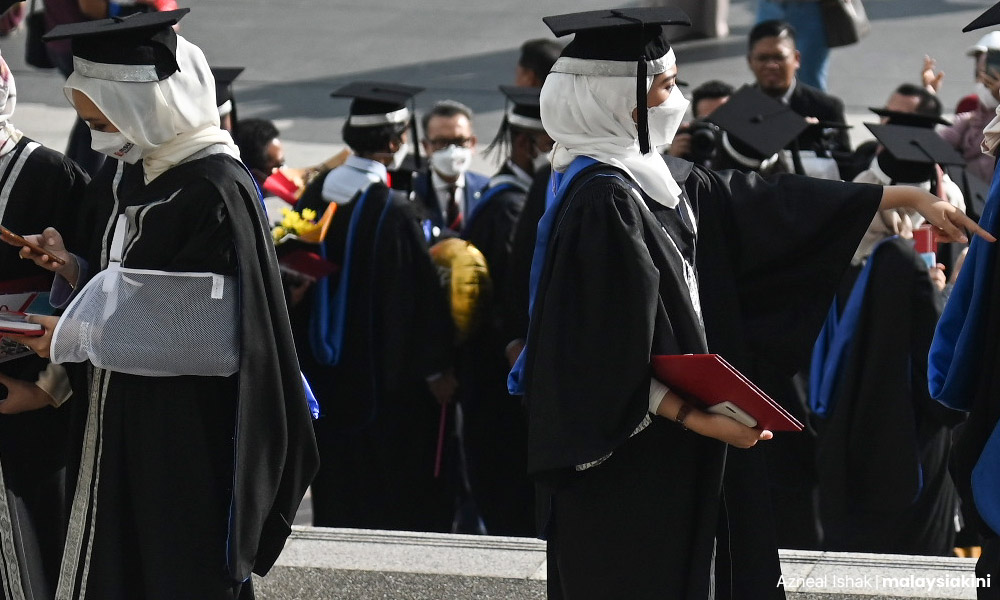Academia exists because it is human nature to search for the truth about something or everything.
Yet, while supposedly searching for truth, universities in Malaysia continue to ignore dishonest, unbalanced, excessive and obsessive practices in the academy.
There are two very simple purposes of the university.
First, universities are meant to be safe spaces where clarity, freedom and honesty of thought are nurtured.
Second, they are environments that value intellectual curiosity for its own sake.
Both are lacking on Malaysian campuses today.
The search for truth enabled by intellectual curiosity is no longer the "business of the day".
Political interference, chasing global university ranking positions, and heavy bureaucratic nonsense have replaced the Malaysian university's fundamental purpose.
Publish-or-perish
Instead, they indulge in the "publish or perish" culture, platforming an ethos prioritising quantity over quality.
These values spill over into society. We have an over-supply of poorly-qualified, unemployable graduates. Quantity but no quality.
Ideally, academics publish (articles and books) because they play a gatekeeping role in communicating new knowledge.
Journal editors and peer reviewers decide what kind of research to disseminate in a particular discipline's network (e.g. International Relations, Nuclear Physics or Economics).
These editors and reviewers are themselves pedantic and robust scholars of supposedly credible standards.
Journals, in particular, are considered important knowledge platforms in research because they communicate accredited and current conceptual and empirical knowledge. They do this much more quickly than books and book chapters.
This, in turn, affects material payoffs for the published authors in the form of academic promotions, job security (tenure) and status in universities and society.
Therefore, academics publish because their social and economic status depends on it.
Status conscious
However, in the current “publish-or-perish” culture, those who publish less will not be promoted.
The fallout from this is that society may view less-published academics as failures.
Their publications, however relevant and profound, will most likely not be read as well.
Thankfully, though, over the last two decades, the impression that a majority of Malaysians have of our universities and their professors has changed.
In a highly feudal and status-conscious society like Malaysia, job titles, credentials and political connections matter greatly.
Increasingly though, the public is waking up to the fact that we are producing too many mediocre professors (including professor emeriti) because of the endless nonsense they publish and utter.
There is a wasteful web of meaningless work produced in the academy. For context, the number of journal articles published yearly in Physics has increased a thousandfold, from 200 articles in 1900 to 200,000 in 2010.
The guarantee of integrity in peer review and the quality of assessing findings during the peer review process has become increasingly difficult.
Scholars are human and can handle only so much material during the peer review process.
Eventually, many will break down and become intellectually careless or cynical. More is not better, obviously.
At some point, quality gives way to quantity. Publishing in academia has already reached this point in most universities in Malaysia and throughout most disciplines.
We should consider abolishing the “publish-or-perish” culture.
Quality publication

Instead, we must bring back the culture of publishing quality articles, book chapters and books.
This will force young and mid-career lecturers to think and reflect seriously on their discipline, writing and analytical skills.
Furthermore, they should be challenged to write relevant analyses that benefit society and improve each Malaysian citizen's life rather than selfishly focusing on themselves.
What about "knowledge production and assimilation"? Currently, most academics write superficial anecdotes in sentences that can reach 10 lines long.
Many are written in ridiculously complicated language, supposedly because this is the standard set by "knowledge centres" of the developed world.
Many cut and paste from their previous publications. They dishonestly declare that a "new" article has been written by them.
Instead, all they have done is merely re-arrange paragraphs, produce a new title and re-word an existing conclusion. They may even bring on board a co-author or two.
Useless fluff
These masters of deception have taken recycling to new heights. Recycling household garbage can be very beneficial to the environment, economy and society.
The published rubbish our academics recycle has zero impact on the environment, communities or the ordinary Malaysian.
Unless we adopt a system that values quality over quantity, our universities will continue to publish useless fluff, pretending to be a profound and duping society in the process with their ranking scores and such.
Unfortunately, the global peer review process is also fraught with deficiencies.
Only last week, I identified a few glaring omissions in an article.
This article appeared in a credible journal that publishes critical analyses of various themes in the social sciences. It is published in the United Kingdom.
The article in question mentioned an International Relations scholar who wrote in the 1950s. His name was listed incompletely as "Wright". Furthermore, the author was referring to "Wight".
Unless readers are well-versed in the article's discussion, they cannot refer to the works of "Wright" or "Wight" to expand their knowledge.
The author did not include any citations. So, the few pages that discuss the relevance of "Wight" to the overall analysis of the article would be lost because of several omissions.
Readers may walk away from this article having not thoroughly grasped the point of it and how it could benefit them, their society, or international politics. This is an extremely shoddy work.
Shoddy work

As mentioned earlier, article reviewers are only human, and there are bound to be mistakes.
However, shoddy work is becoming more apparent in so-called credible journals. Therefore, it is time to re-evaluate our universities' preference for quantity over quality.
Instead, it is better if our universities focus on the teaching and research capabilities of professors. Universities should insist that professors devote more time to teaching, mentoring and supervising their students.
Students, after all, look up to their professors. They would want to emulate professors who are intellectuals and whose works are relevant to them, to their parents, and to their friends with whom they grew up. Most crucially, their university education must positively impact their children's future.
It is such a waste that most of the research done by our social scientists has brought microscopic benefits to the nation. Many public universities in Malaysia advertise themselves as engaging in "research with impact". Where and what is the impact?
I have yet to read a credible and critical study on the level of "impact-ness" the various types of research conducted by our universities has on society. It is time for the government and the Higher Education Ministry to take this seriously.
Furthermore, KPI points awarded for teaching and research should be at par.
Teaching has been in a subordinate position for far too long, and this makes absolutely no sense. Instead, more points are awarded for research, most of which remain obscure and irrelevant to the country.
We seem to have neglected the teaching profession, which embodies schools and universities.
Teaching must be at the centre of our quest to advance the nation. - Mkini
SHARIFAH MUNIRAH ALATAS is a retired academician with zero tolerance for corrupt, arrogant, and frivolous leadership.
The views expressed here are those of the author/contributor and do not necessarily represent the views of MMKtT.




No comments:
Post a Comment
Note: Only a member of this blog may post a comment.